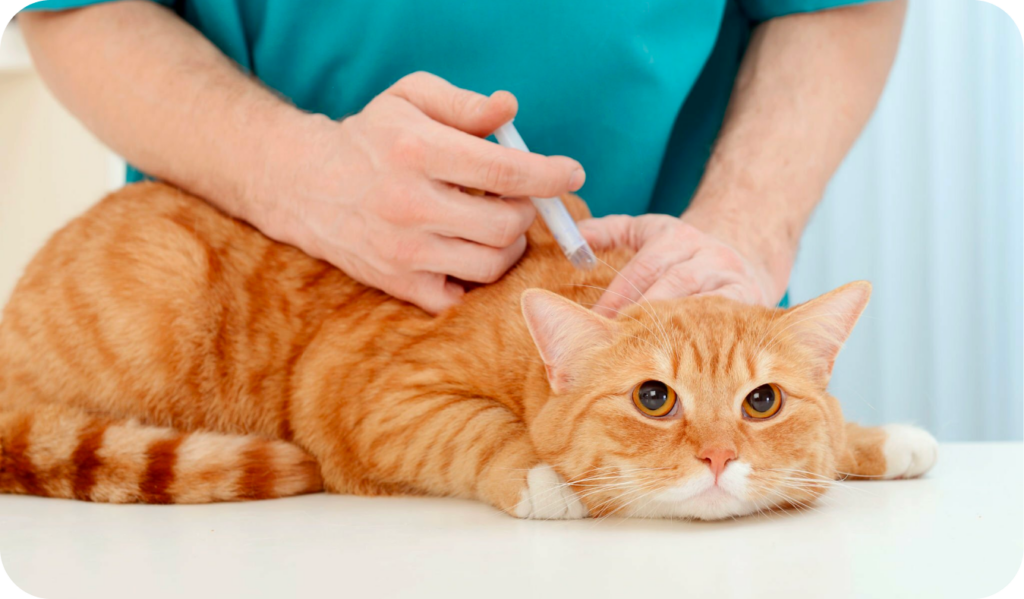Healthcare
Cat Vaccination

 Nationwide Availability of F3 Vaccines
Nationwide Availability of F3 Vaccines
We are pleased to announce that F3 vaccines are now available nationwide. Unfortunately FIV vaccines are not available nationwide at this time. If you have any questions about these vaccines, please do not hesitate to contact us. Our team is here to provide information and assistance.
Vaccination has revolutionised control of infectious disease in our pets. It is essential that all pets are adequately vaccinated to help protect the pet population as a whole. Responsible pet care requires kittens to be given their initial course of vaccinations, but this cannot protect them for the rest of their lives. Adult cats require regular vaccination to maintain immunity against disease.
At North Maclean Family Vet, we use an F3 vaccine, which provides immunity against Feline Panleukopenia Virus, Feline Rhinotracheitis virus and Feline Calicivirus.
The cost of our adult F3 vaccination and health check is $91.95. Our kitten F3 vaccination and health check is $86.00.
Kittens are ‘temporarily’ protected against many diseases by antibodies received through their mother’s milk. These maternal antibodies decline in the first couple of months of their lives, after which vaccinations are required to induce immunity against disease. A series of vaccinations is necessary for a kitten to adequately stimulate the immune system.
Initial vaccination programs should provide three vaccinations 4 weeks apart against the following: feline panleukopenia virus, feline calicivirus, feline herpesvirus, at or after 8 weeks of age.
Three vaccinations, 2 weeks apart, against feline immunodeficiency virus (FIV) are recommended at or after 8 weeks of age for cats who will have any form of outdoor access.
Following vaccination some cats may be off-colour, or have a slight swelling or tenderness at the injection site. These symptoms are normally mild and should only last a day or two.
Here are some ways to help look after your pet if they develop any mild side effects after vaccination:
- Provide them with a comfortable place to rest
- Do not give any medications unless instructed by your veterinarian
- Check on your pet regularly
- Make sure they have access to their water and food
- Your pet may be quieter than usual, and appear less interested in playing with you. This is OK! They will come to you for attention when they are feeling better
Did you know?
INFECTIOUS DISEASES OF CATS THAT WE CAN VACCINATE AGAINST
90% of ‘cat flu’ cases are caused by feline herpesvirus (also known as feline rhinotracheitis) and/or feline calicivirus.
Feline respiratory disease affects cats of all ages, especially young kittens. It is highly contagious and causes sneezing, coughing, runny eyes, nasal discharge, loss of appetite and tongue ulcers.
Fortunately, the death rate is low except in young kittens, but the disease is distressing and clinical signs may persist for several weeks. Recovered cats can continue to carry and spread the infection for long periods, and can show signs of the disease again if they become stressed.
Chlamydia felis is a bacterial disease which is responsible for up to 30% of conjunctivitis in cats, and causes severe and persistent signs.
Kittens are more commonly affected by Chlamydia felis when also infected with “Cat Flu”, and Chlamydia felis can be shed for many months. Vaccination against cat flu and Chlamydia felis helps protects against clinical disease.
This disease has low prevalence in our region, so it is not included in our core vaccination program.

Book a session for your pet with one of our vets

